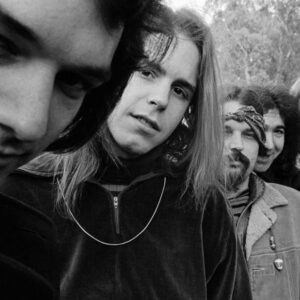There’s no getting around it: Dreaming of Dead People is an extremely strange book. Born in 1941, Rosalind Belben was first published in the 1970s; this, her fourth novel, first came out in 1979. Her eighth and most recent, Our Horses in Egypt, won the James Tait Black award in 2007.
Dreaming of Dead People might best be described as an early example of autofiction: its narrator, Lavinia, is the same age as Belben was at the time of writing, and she recalls a similar childhood in Dorset, including a father who was a Royal Navy commander and who was killed when she was three. Belben has described the book as “a study of the human figure”, and given its parallels with her own life story and its raw and deeply personal style any reader could be forgiven for assuming that the figure is her own.
The book is divided into six very different sections, including a stay in Venice, a treatise on masturbation, a description of a beloved dog’s euthanasia and a vivid erotic daydream involving Robin Hood. It is hard, at first, to understand how these parts relate to one another, for this uncompromising book offers few obvious clues, but on second reading they shift and merge, and the payoff for this extra mental and imaginative effort is a truthful and vivid portrait of a highly particularised human consciousness.
In the first section, At Torcello, Lavinia recalls a trip to the Venetian island in winter. She is there to see a Byzantine mosaic of the Virgin Mary and baby Jesus, an image of motherhood that will echo through the book. While she is on the island she meets an English family for whom she will later babysit during a power cut, her relationship to children and the idea of family coming slowly into focus.
Torcello and Venice itself are made strange by the things she notices, and by her attitude to them, both at the time and in recollection: a pregnant dog, a miserable rat, a canal’s water, “dull of eye”. “In that sour and barren place, a spinster, who did not wish for the dry, un-rustling grass. I weep with mortification. Yet I was extremely happy.” Belben’s angular syntax, frequent ellipses and unusual punctuation force the reader to slow down, think, and pay attention.
It becomes clear that Lavinia is full of regrets. Having nursed her mother through a long final illness, she has not had sex for 10 years and wonders if others now see her as “not among the fuckers of this world”. She had assumed she would marry and have children, but nobody ever proposed; in today’s world, of course, she would not consider herself “a shrivelled person … an old maid” at 36, but things were different in the 1970s, something which makes her lack of shame all the more remarkable: “I have woken sopping and swollen, with a devil to suppress between my legs.”
If this novel is as confessional as it seems, it is truly fearless: death, ageing, anorgasmia, loneliness, despair and madness are all here, jostling for attention, just as they do for many of us, for all we may seek to tune them out. Meanwhile, Lavinia learns to masturbate with an electric toothbrush.
The Robin Hood section is a change of gear so abrupt it risks whiplash. As a child Lavinia identified with the idea of a forest-dwelling outlaw (“the myth of the greenwood … a cosy, complete, limited life”), and loved books about children who live outdoors: BB’s classic Brendon Chase and Arthur Ransome’s Swallows and Amazons also form part of the fantasy. But this book is no fairy story, instead a sensuous, funny account of a sexual encounter between Hood and the wife of Sir Richard atte Lee, a figure from early medieval ballads. This is a vision of sexuality as pure, natural and incorruptible, a vital component in what today’s pop psychologists might call Lavinia’s “love map”.
As the sections unfold, a succession of images and recollections relentlessly and obliquely illuminate one another in the manner of an Adam Curtis film. We glimpse Lavinia’s relationship with her beloved but complicated mother (“something stiff and unyielding, fierce and loving”) and learn more about her deep affinity for animals, particularly horses and dogs, both subjects of Belben’s own later books; we understand her attitude to death, and to London; see the damage inflicted by her schooling, and witness her sustaining, at times ecstatic relationship with the natural world (her account of a trip to Scotland beats nearly all of today’s nature writing into a cocked hat). She imagines the daughter she might have had, and names her “Jessie”, but dwells uneasily on the very different childhood she would doubtless have compared with her own: “She would reckon a Forestry Commission plantation is a nice wood to walk in … she wouldn’t have a clue about apples, how to pick them, how to store them: or pears.”
You can feel Lavinia/Belben thinking and imagining her way through something that she might otherwise have had the opportunity to understand in practice: the inevitable distance between generations and the inexorable pace of change. “I am worried that Jessie won’t read,” she writes [italics her own]. “It would be my greatest dread.”
The last pages of Dreaming of Dead People dissolve into an impressionistic but carefully structured stream of consciousness, dwelling on ageing and mortality, loneliness and inner strength: extraordinary from any writer, but particularly from one in only her middle 30s. It is extremely beautiful, utterly convincing, and rivals anything by Virginia Woolf. “There comes a time for making peace with oneself,” Belben writes, as Lavinia. “Life as I have known it is ending. I am drying up … I am saying: here is a life, what do you make of it. And trying not to mind that you turn aside.”





